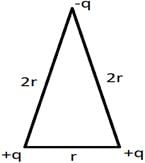Test: Electrostatic Potential due to a Point Charge - JEE MCQ
10 Questions MCQ Test - Test: Electrostatic Potential due to a Point Charge
Electric potential due to a point charge q at a distance r from the point is _______ (in the air).
Calculate electric potential due to a point charge of 10C at a distance of 8cm away from the charge.
What is the amount of work done to bring a charge of 4*10-3C charge from infinity to a point whose electric potential is 2*102V?
Two point charges 10C and -10C are placed at a certain distance. What is the electric potential of their midpoint?
What is the electric potential of the system?

A small charge q is rotated in a complete circular path of radius r surrounding another charge Q. The work done in this process is _________
Two plates are kept at a distance of 0.1m and their potential difference is 20V. An electron is kept at rest on the surface of the plate with lower potential. What will be the velocity of the electron when it strikes another plate?
Electric field intensity and electric potential at a certain distance from a point charge is 32 N/C and 16 J/C. What is the distance from the charge?
Three charges –q, Q and –q are placed in a straight line maintaining equal distance from each other. What should be the ratio q/Q so that the net electric potential of the system is zero?
Three positive charges are kept at the vertices of an equilateral triangle. We can make the potential energy of the system zero by adjusting the amount of charges. This statement is ______


 .
. .
.

 and electric potential between two charges +q and –q is
and electric potential between two charges +q and –q is  . Therefore the electric potential of the system is
. Therefore the electric potential of the system is  Electric potential is a scalar quantity and thus the system becomes zero-potential-system.
Electric potential is a scalar quantity and thus the system becomes zero-potential-system. and electric potential at that point is
and electric potential at that point is  Therefore,
Therefore,  and
and  Dividing these two equations, we get r=0.5m. If the medium is air, k=1. Thus we can get the value of q=0.89 C.
Dividing these two equations, we get r=0.5m. If the medium is air, k=1. Thus we can get the value of q=0.89 C. But the total energy of the system is zero. So, -qQ-qQ+ q2/2
But the total energy of the system is zero. So, -qQ-qQ+ q2/2 










